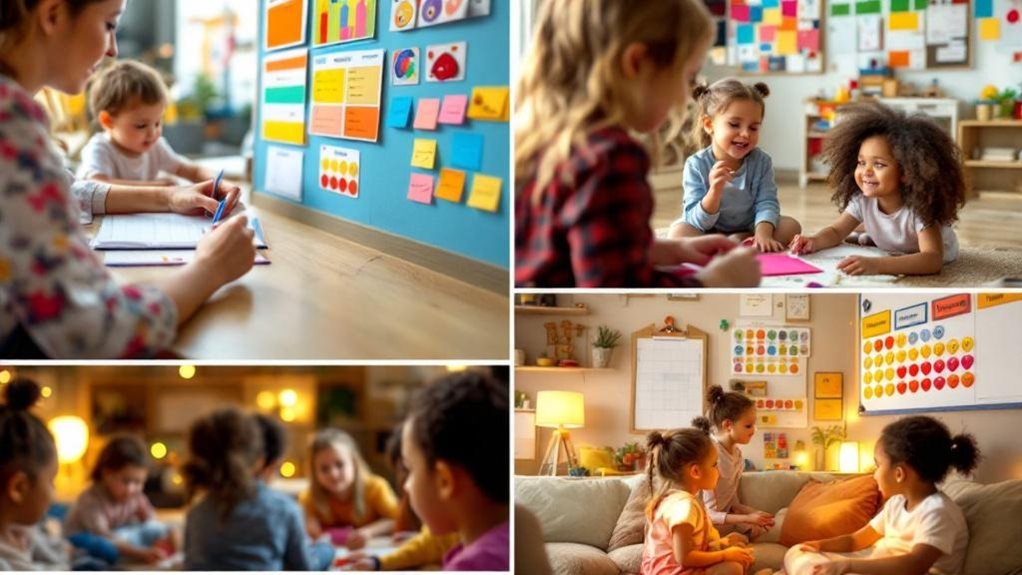Physical Address
304 North Cardinal St.
Dorchester Center, MA 02124
Physical Address
304 North Cardinal St.
Dorchester Center, MA 02124

Jump-start your child's behavioral transformation with five game-changing intervention strategies that create lasting success in school and beyond.
You can transform your child’s behavioral challenges through five proven intervention strategies: implementing daily check-in/check-out systems that provide consistent monitoring and feedback, establishing school-wide positive behavioral support frameworks with clear expectations, using Applied Behavior Analysis techniques like role-playing and visual supports for skill development, creating environmental modifications such as sensory-friendly spaces and quiet retreat zones, and building strong family-school collaboration programs. These evidence-based approaches work together to address your child’s unique needs while fostering independence and success across all settings.
When students struggle with behavioral challenges that disrupt their learning and social interactions, Check-in/Check-out (CICO) systems offer a structured, evidence-based approach to daily support and monitoring.
You’ll implement CICO as a Tier 2 intervention by establishing morning check-ins and afternoon check-outs with targeted students. This consistent routine helps children develop appropriate behaviors through regular feedback and adult attention. CICO effectiveness increases considerably when you collaborate with parents, teachers, and support staff to maintain communication across all environments.
You can enhance motivation through meaningful student incentives that recognize positive behavioral progress. The system’s strength lies in its predictable structure and continuous progress monitoring, allowing you to make data-driven adjustments. This intervention specifically targets the 10-15% of students who struggle to meet behavioral expectations in traditional classroom settings. When implemented with fidelity, CICO creates supportive relationships that foster both behavioral growth and academic success for struggling students.
While individual interventions like CICO provide targeted support for specific students, School-Wide Positive Behavioral Interventions and Support (SWPBIS) creates the thorough foundation that makes these individual strategies more effective.
The SWPBIS framework transforms your entire school culture through multi-tiered behavioral support. You’ll establish clear expectations and social norms that benefit every student while using data-driven decision making to continuously improve outcomes. This evidence-based approach reduces discipline issues and enhances student engagement across all grade levels. Research demonstrates that SWPBIS serves as an evidence-based practice that significantly reduces exclusionary discipline methods while improving behavioral outcomes.
Your implementation success depends on strong leadership support and effective team functioning. You’ll need organizational prerequisites in place, including ongoing staff training and aligned beliefs among educators. When you maintain these elements with consistent community stakeholder support, you’ll create sustainable positive behavioral changes that last beyond initial implementation phases.
Beyond establishing school-wide behavioral frameworks, Applied Behavior Analysis (ABA) techniques provide you with precise, evidence-based methods to develop specific skills in individual children. You’ll find role playing techniques particularly effective for building communication and social competencies, allowing children to practice conversations and social interactions in supportive settings.
For non-verbal children, picture exchange systems create meaningful communication pathways by connecting visual symbols with expressed needs. Task analysis helps you break complex self-care and daily living skills into manageable steps, while discrete trial training strengthens problem-solving abilities through structured repetition.
These targeted interventions work because they’re individualized to each child’s developmental needs. Board-certified behavior analysts conduct comprehensive assessments to ensure treatment goals align with each learner’s specific requirements across communication, social skills, and self-care areas. By combining techniques like positive reinforcement, social stories, and video modeling, you’re creating thorough support systems that foster genuine skill acquisition and lasting behavioral growth.
Your physical environment shapes behavior just as powerfully as any teaching technique you’ll implement. When you strategically modify surroundings, you’re preventing challenging behaviors before they start rather than simply reacting afterward.
Create sensory friendly spaces by removing visual clutter and positioning children away from high-traffic areas. You’ll reduce overstimulation that triggers meltdowns and attention difficulties. Establish quiet retreat zones where overwhelmed children can self-regulate safely.
Routine consistency becomes easier when you design predictable environments. Use visual checklists and organize materials in consistent locations. Turn off screens during focused activities and guarantee accessibility with appropriate seating arrangements.
Your thoughtful environmental adjustments—from accessible kitchen appliances to strategic classroom seating—demonstrate respect for each child’s unique needs while fostering independence and emotional regulation.
When families and schools work together as true partners, children experience the consistency and reinforcement they need to maintain behavioral progress across all settings. You’ll find that effective family engagement creates a unified support system where behavioral expectations align between home and school environments.
Successful collaborative initiatives require intentional strategies that honor diverse family perspectives while building lasting relationships:
These evidence-based approaches guarantee children receive consistent behavioral support while strengthening the crucial partnership between families and educators.